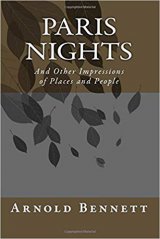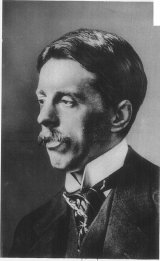Paris Nights and Other Impressions of Places and People Page #8
Enoch Arnold Bennett (27 May 1867 - 27 March 1931) was an English writer. He is best known as a novelist, but he also worked in other fields such as the theatre, journalism, propaganda and films. Bennett was born in a modest house in Hanley in the Potteries district of Staffordshire. Hanley was one of the Six Towns that were joined together at the beginning of the 20th century as Stoke-on-Trent and are depicted as "the Five Towns" in some of Bennett's novels. Enoch Bennett, his father, qualified as a solicitor in 1876, and the family moved to a larger house between Hanley and Burslem.
- Year:
- 1913
- 108,250 Views
***** The talk on art was resumed, the renowned Tommy Strutt being reduced to his proper level of the third-rate and abruptly dismissed. One o’clock! A quarter past one! The café was now nearly empty. But these men had no regard for time. Time did not exist for them, any more than the structure of society. They were not bored, nor tired. They conversed with ease, and with mild pleasure in their own irony and in the disillusioned surety of their judgments. Then I noticed that the waiters had dwindled to two, and that only one cashier was left enthroned behind the bar; somewhat later, she too had actually gone! Both had at length rejoined their families, if any. The idea was startling that these prim and neat and mechanically smiling women were human, had private relations, a private life, a bed, a wardrobe. All over Paris, all day, every day, they sit and estimate the contents of trays, which waiters present to their practised gaze for an instant only, and receive the value of the drinks in bone discs, and write down columns of figures in long ledgers. They never take exercise, nor see the sun; they even eat in the café. Mystic careers!... A quarter to two. Now the chairs had been brought in from the terrace, and there was only one waiter, and no other customer that I could see. The waiter, his face nearly as pale as his apron, eyed us with patient and bland resignation, sure from his deep knowledge of human habits that sooner or later we should in fact depart, and well inured to the great Parisian principle that a café exists for the convenience of its habitués. I was uneasy: I was even aware of guiltiness; but not my friends. Then a face looked in at the doorway, as if reconnoitring, and hesitated. “By Jove!” said the violoncellist. “There’s the Mahatma back again! Oh! He’s seen us!” The peering face preceded a sloping body into the café, and I was introduced to a man whose excellent poems I had read in a limited edition. He was wearing a heavily jewelled red waistcoat, and the largest ring I ever saw on a human hand. He sat down. The waiter took his order and intoned it in front of the service-bar, proving that another fellow-creature was hidden there awaiting our pleasure. When the Mahatma’s glass was brought, the Scotchman suddenly demanded from the waiter the total of our modest consumption, and paid it. The Mahatma said that he had arrived that evening direct from the Himalayas, and that he had been made or ordained a “khan” in the East. Without any preface he began to talk supernaturally. As he had known Aubrey Beardsley, I referred to the rumour that Beardsley had several times been seen abroad in London after his alleged death. “That’s nothing,” he said quickly. “I know a man who saw and spoke to Oscar Wilde in the Pyrenees at the very time when Oscar was in prison in England.” “Who was the man?” I inquired. He paused. “Myself,” he said, in a low tone. “Shall we go?” The Scotchman, faintly smiling, embraced his friend and me in the question. We went, leaving the Mahatma bent in solitude over his glass. The waiter was obviously saying to himself: “It was inevitable that they should ultimately go, and they have gone.” We had sat for four hours. Outside, cabs were still rolling to and fro. After cheerful casual good-nights, we got indolently into three separate cabs, and went our easy ways. I saw in my imagination the vista of the thousands of similar nights which my friends had spent, and the vista of the thousands of similar nights which they would yet spend. And the sight was majestic, tremendous. IV--BOURGEOIS You could smell money long before you arrived at the double portals of the flat on the second floor. The public staircase was heated; it mounted broadly upwards and upwards in a very easy slope, and at each spacious landing was the statue of some draped woman holding aloft a lamp which threw light on an endless carpet, and on marble mosaics. There was, indeed, a lift; but who could refuse the majestic invitation of the staircase, deserted, silent, and mysterious? The bell would give but one ting, and always the same ting; it was not an electric device by which the temperament and mood of the intruder on the mat are accurately and instantly signalled to the interior. The door was opened by the Tante herself--perhaps she had been crossing from one room to another--and I came into the large entrance-hall, which even on the brightest summer day was as obscure as a crypt, and which the architect had apparently meant to be appreciated only after nightfall. A vast armoire and a vast hat-and-coat stand were features of it. “My niece occupies herself with the children,” the Tante half-whispered, as she took me into the drawing-room. And in her voice were mingled pride, affection, and also a certain conspiratorial quality, as though the mysteries of putting a little boy and a little girl to bed were at once religious and delicious, and must not be disturbed by loud tones even afar off. She was a stout woman of seventy, dressed in black with a ruching of white at the neck and the wrists; very erect and active; her hair not yet entirely grey; an aquiline eye. The soft, fresh white frill at the wrist made a charming contrast with the experienced and aged hand. She had been a widow for very many years, and during all those years she had matched herself against the world, her weapons being a considerable and secure income, and a quite exceptional natural shrewdness. The result had left her handsomely the victor. She had an immense but justifiable confidence in her own judgment and sagacity; her interest in the spectacle of existence was unabated, and a long and passionate study of human nature had not embittered her. She was a realist, and a caustic realist, but she could excuse; she could accept man as she knew him in his turpitude. Her chief joys were to arrange and rearrange her “reserves” of domestic goods, to discuss character, and to indicate to a later generation, out of her terrific experience of Parisian life, the best methods of defence against the average tradesman and the average menial. So seldom did anybody get the better of her that, when the unusual did occur, she could afford to admit the fact with a liberal laugh: “Il m’a roulée, celui-là! Il a roulé la vieille!” In a corner of the drawing-room she resumed the topic, always interesting to her, of my adventures among charwomen, generously instructing me the whole time in a hundred ways. And when the conversation dropped she would sigh and go back to something previously said, and repeat it. “So she polishes the door-knobs every day! Well, that is a quality, at least.” Then my hostess (her niece-inlaw) came blandly in: a woman of thirty-five, also in mourning, with a pale, powdered face and golden hair; benevolent and calm, elegant, but with the elegance of a confessed mother.
Translation
Translate and read this book in other languages:
Select another language:
- - Select -
- 简体中文 (Chinese - Simplified)
- 繁體中文 (Chinese - Traditional)
- Español (Spanish)
- Esperanto (Esperanto)
- 日本語 (Japanese)
- Português (Portuguese)
- Deutsch (German)
- العربية (Arabic)
- Français (French)
- Русский (Russian)
- ಕನ್ನಡ (Kannada)
- 한국어 (Korean)
- עברית (Hebrew)
- Gaeilge (Irish)
- Українська (Ukrainian)
- اردو (Urdu)
- Magyar (Hungarian)
- मानक हिन्दी (Hindi)
- Indonesia (Indonesian)
- Italiano (Italian)
- தமிழ் (Tamil)
- Türkçe (Turkish)
- తెలుగు (Telugu)
- ภาษาไทย (Thai)
- Tiếng Việt (Vietnamese)
- Čeština (Czech)
- Polski (Polish)
- Bahasa Indonesia (Indonesian)
- Românește (Romanian)
- Nederlands (Dutch)
- Ελληνικά (Greek)
- Latinum (Latin)
- Svenska (Swedish)
- Dansk (Danish)
- Suomi (Finnish)
- فارسی (Persian)
- ייִדיש (Yiddish)
- հայերեն (Armenian)
- Norsk (Norwegian)
- English (English)
Citation
Use the citation below to add this book to your bibliography:
Style:MLAChicagoAPA
"Paris Nights and Other Impressions of Places and People Books." Literature.com. STANDS4 LLC, 2025. Web. 12 Mar. 2025. <https://www.literature.com/book/paris_nights_and_other_impressions_of_places_and_people_110>.








Discuss this Paris Nights and Other Impressions of Places and People book with the community:
Report Comment
We're doing our best to make sure our content is useful, accurate and safe.
If by any chance you spot an inappropriate comment while navigating through our website please use this form to let us know, and we'll take care of it shortly.
Attachment
You need to be logged in to favorite.
Log In